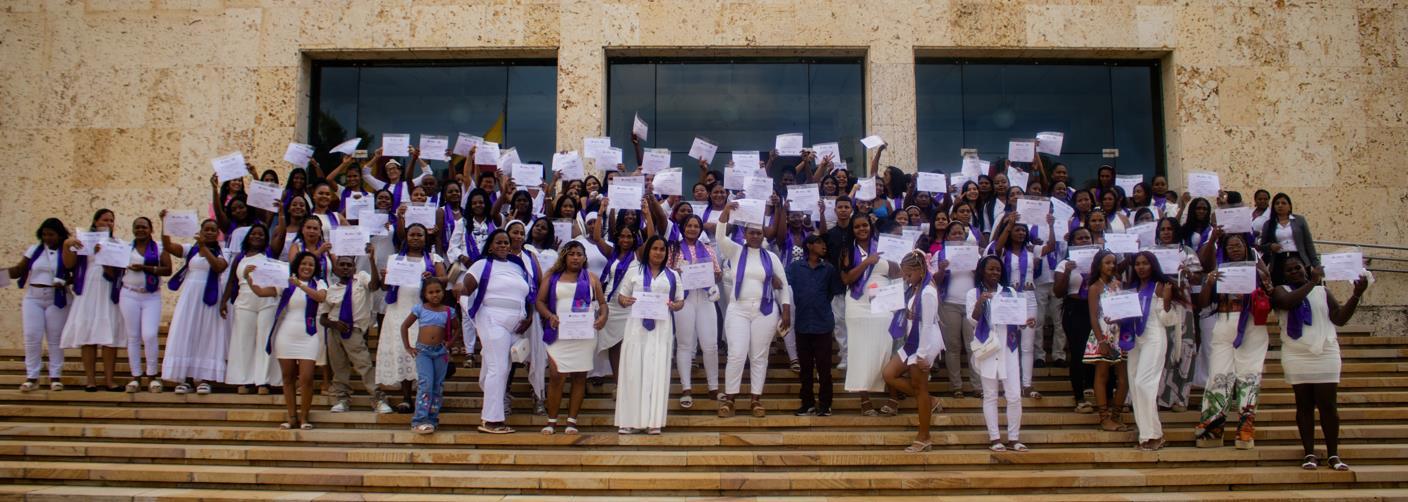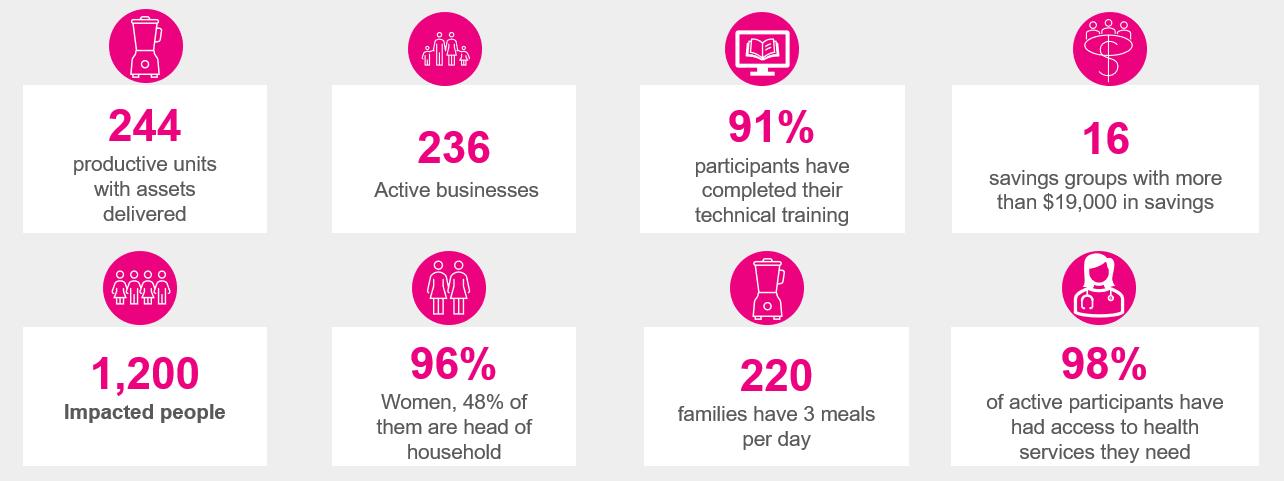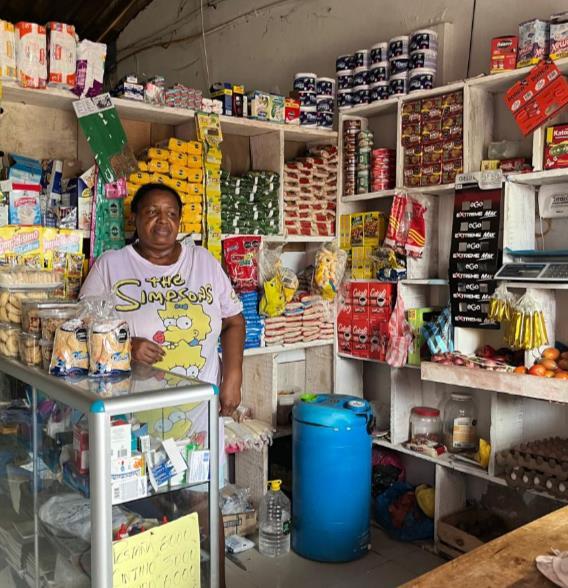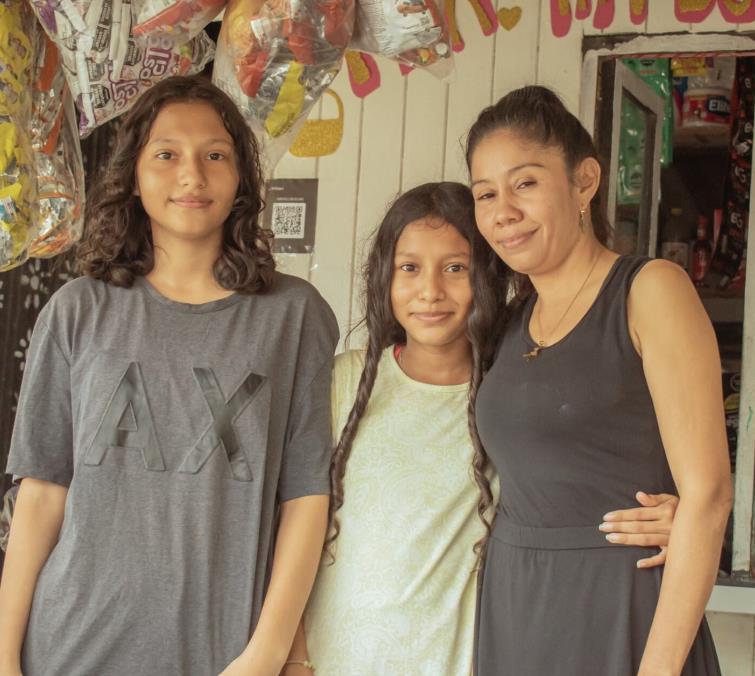




Inaugural Cohort Completes Two-Year Ultra-Poverty Graduation Program, September 2024
For more than fifty years, Opportunity International has been driven by our North star: providing the chance for people living in the deepest poverty to create sustainable livelihoods. Certainly not easy work and never a “quick fix,” people often ask about the results of fighting poverty one family at a time.
Thanks to the faithful focus of families in Colombia and the unflagging support of Opportunity’s team of experts, we are grateful to share the results of our first cohort of graduates from the Ultra-Poverty Graduation program in Colombia: more than 200 families have “graduated” from the lowest level of poverty:
► 91% of graduates started the program living on 83 cents a day—less than half of Cartagena’s extreme poverty line.
► At “Graduation,” those families are living on $2.53 a day—emerging from the deepest poverty on the road to sustainable livelihoods.
The results of the first Ultra-Poverty Graduation program in urban Cartagena, Colombia indicate that the approach significantly changes the lives of the participants, their families, and their communities
Opportunity staff who have and will continue to support participants throughout the program note the significance of the program not just in quantitative impact: “People are different; they look, talk, and act differently” they have more confidence and deeper connections to their families and their communities.



In Cartagena, Colombia, Opportunity International’s Graduation program is called Pathway to Opportunities. We launched the first cohort of 250 families in January 2023 preceded by six months of planning, partnership- and community-building, and the selection from 650 families. In August 2024, we celebrated the conclusion of this Graduation cohort which had a graduation success rate of 86.4% of active clients. To graduate successfully, participants had to demonstrate significant improvements in their initial conditions and meet the criteria in four areas: food security, economic resilience, basic rights/services, and community connections.
The program supports families living in extreme poverty. Some initial demographics for the first cohort of Colombia’s Pathway to Opportunities include:
• 8% migrant clients
• 72% clients between 18-39 years old; 28% clients over 40
• 79.6% female head of households
• 44% clients live with family; 47.6% dwellings have no floor
• 90.8% clients initially had no access to financial products or services
After two months spent identifying and selecting eligible families, the participants spend 18 months in the program. Critical to the success of this deeply client-centric program are the “duplas,” two coaches/ facilitators assigned to each participant one focused on livelihood training and support, and the other a specialist in social work/psychosocial dynamics; emotional stability is as important as business knowledge. Each dupla worked with about 36 families. The impact of this program goes beyond the participant, as all family members play key roles in improving their quality of life.
One hundred percent of participants began the program in strata one the lowest income communities in the country. For this first cohort, 86.4% of active clients fully completed the rigorous program which included job training, financial literacy, family wellbeing, and community/social connections. Participants chose from carefully-selected income-generating options (right) and participated in skills training in that field.
On August 12, 2024, Opportunity friends, colleagues, and senior leaders gathered with the families of 204 Graduation participants to celebrate their perseverance, dedication, deep faith, and hard work and it was a remarkably inspirational day of optimism and hope.
Productive Clothing manufacture
Productive Artisanal fishing
Productive Restaurant/soft drinks shops/bakery
Services
pool/aquatic rescue
Commercial Housemaids/wait staff/hotel staff
Industrial Logistics
Industrial Metal mechanic



► 93% consumed 3 meals a day on average up from only 9 families at the start
► 93% have enough resources/food for the next 5 days compared to 4% at beginning of program
► 107% increase in average monthly household income
► 86% are now committed to regularly saving; 30% accumulated savings equal to 25%+ of the household income; participants saved more than $22,400 in total thanks to savings groups
► 91% exceeded Cartagena’s extreme poverty line
► 100% of the families enrolled in health service
► 92% of out-of-school children returned to school
► 70% of families are committed to their well-being through improvements in housing conditions
► 96% participated in at least one community activity in the past 3 months
► 93% of families have achieved greater confidence and autonomy, which helps them to have greater community participation

The complexity of an intervention based on multi-dimensional poverty has its challenges to achieve real, long-term change. Our staff carefully monitored and evaluated the experience of Colombia’s first Graduation cohort. The findings below will be carried forward:
► Importance of the coaches: Compared to businessfocused training and microfinance services, a holistic ultra-poor graduation program is a greater investment of time and resources. In addition, the model requires close and continuous coaching by the duplas (facilitators). However, the impact of this investment is reflected in the enormous gains achieved. This approach allows families to achieve self-sufficiency and develop strategies that ensure their long-term sustainability.
► Mobility of participants: One of the challenges is the dropout of participants, due mainly to changes of residence. For example, Venezuelan migrants have returned to their home country or moved to other cities in Colombia. Participants change locations due to domestic violence or safety in their neighborhood. We are defining strategies to reduce this risk so that families can successfully complete the intervention.
► Creating a culture of saving: At the beginning of the program, families were unfamiliar with the culture of saving and had preconceived ideas like saving was impossible given their living conditions. Mistrust was an additional factor: many families expressed feeling safer keeping their savings at home, in their own piggy banks, for security reasons. It is essential to have various options to promote the culture of saving, whether through savings groups, personal piggy banks, or even by banking from an early stage. It is also crucial to continue working on motivation, promoting collective actions that strengthen social capital and generate trust in support networks.
► Mental health: The poor mental and emotional health of some participants has affected the sustainability of the productive units, leading to the sale of their assets to cover non-urgent expenses. Additionally, there are






situations of abandonment and/or physical and psychological violence by their partners, which interfere with the progress of the project.
► Diversifying sources of income: Thanks to technical training and the coaching of the duplas, many families alternated their livelihoods with formal jobs obtained during the program key for families to achieve self-sufficiency more quickly and sustainably.
► Safety: The lack of security resulting from the scarcity of opportunities for young people can result in micro-trafficking networks and sexual exploitation. It is imperative to define strategies that guarantee the safety of the team in the field and raise awareness among families about prevention. It is also crucial to coordinate with the National Police to support the communities where the program operates.
► Gender-based violence: In addition to the safety concerns noted above, gender-based violence against women is one of the main reasons why some participants fail to make progress towards meeting graduation criteria. During the intervention, several situations arose that forced participating women to leave their homes to guarantee their integrity. Therefore, it is necessary to have defined strategies to address these situations as well as strategic allies who are experts in gender-based violence.
► Childcare: 96% of the participants in the program were women. As a result, the activities were challenging, as many attended with young children due to the lack of childcare options. This hindered the optimal development of the training processes, the concentration of the participants, the use of some spaces with special conditions, and the assimilation of learning. Therefore, it will be important to define strategies for the next versions of the program, such as having interns or allies to help create daycare or childcare spaces during the trainings, so that children are safe while their mothers participate in the training process.
For at least the next 12 months, one staff facilitator will follow up with the graduates from cohort one to support them as they venture out on their own either managing their own businesses or working in various trades and industries and to collect additional data.
Thanks to the tireless efforts of our staff on the ground in Colombia including nurturing local partnerships, gathering learnings from the first cohort, and continuing to identify potential families for future participation and our generous supporters, we are excited to announce that we are launching a second cohort of 250 new families to participate in Graduation starting this fall. The City of Cartagena has experienced such success in partnership with Opportunity over the past two years that they have committed to support an additional 250 families through Graduation a total of 500 families will be working their way out of poverty by participating in this proven program!

Marvellis Luz Buelvas Olmos, a 42-year-old mother of three daughters, has experienced a remarkable transformation in her life and now in her new business since participating in “Pathway to Opportunities” Graduation program. With a husband who was initially unemployed due to health problems, Marvellis took on the challenge of entrepreneurship with a business that has improved her family's living conditions. Marvellis’ active and grateful participation in the program has been a fundamental pillar of her success. From the difficult days when they barely had the necessities, their grocery store now generates sales of more than $512 per month with a wider range of products including basic medicines, creams, and perfumes.


Thanks to her dedication and organization, she has significantly increased her sales month after month. Now that she has all the legal documents she needs to sell to companies, she will begin to expand her market by offering her products to AGAPE Opportunity’s partner on the ground in Colombia for events and trainings, which will further increase the profitability of her business.
Having been displaced from her home twice, Marvellis and her family are deeply relieved and proud of their accomplishments and the promising future that awaits them.
We are filled with gratitude for the people we serve and for people like you who make that work possible. We hope you feel our celebratory spirit as we conclude the journey of the first cohort of 250 families in Cartagena, Colombia who participated in Opportunity’s Ultra-Poverty Graduation program families who, two years ago, were challenged to provide the most basic necessities like food and shelter; families who now have the training and support to work their way out of poverty one opportunity at a time. Thanks to our clients’ unstoppable perseverance, our staff’s client-centric expertise, and the generosity of our supporters, we are breaking the bonds of intergenerational poverty, one family at a time.
A traditional graduation offers the opportunity both to look back in celebration and look forward to applying the newly-gained knowledge and confidence to move forward with intention.
For more than 200 families in Colombia, this graduation truly means walking on a “Pathway to Opportunities” that changes the trajectory of their lives and the lives of their future generations. This graduation is one moment in time that impacts decades to come.
Thank you for being on this path with our brothers and sisters in Colombia.


The Graduation program offers a long-term solution whereby families living below the extreme poverty mark of two dollars a day—truly living in subsistence mode—receive support to secure food; start one or two income-generating businesses; learn basic financial skills; benefit from mentorship and community linkages support that will pave a holistic, viable path out of poverty.
The Graduation model consists of the systematic, sequenced implementation of a series of components that help people in extreme poverty to "graduate" by improving their living conditions over a period of 18 to 36 months. Among the main components are a time-limited security stipend, savings, technical training, transfer of assets, and coaching in basic skills. . Most candidates for Graduation are women with dependents or persons with disabilities who lack reliable access to basic needs like food and water.
The Graduation program fits well with Opportunity International’s core model of financial services, training, and support; we tailored it for those who are living at the lowest levels of poverty imaginable. We have witnessed the powerful impact of Graduation in Haiti and Malawi; this first cohort of Graduation in Colombia represents our first pilot in an urban area.



Components Actions taken
• 2,200 comprehensive, bimonthly coaching visits by the duplas
Coaching
Security stipend
Referral and links
• 4,320 visits to support the duplas’ psychosocial and livelihood approach
• 4 multi-purpose grants per family to support food security and living conditions
• Connections with public, private, social, and educational entities to close gaps (depending on families’ specific needs)
Results
• More than 6,000 monthly regular visits for families to gain skills and self-confidence
• Families received between $220$300 (total $72,500)
Financial inclusion
• Families participated in two eightmonth cycles of savings groups with their program partners plus friends or neighbors, allowing self-management and leadership
• Financial education workshops were developed with support from the Agrarian Bank.
• More than 5 banking days were held with the support of the Agrarian Bank so that families had access to staff support, could open savings accounts, and access microcredits to strengthen their productive units (their incomegenerating work)
• More than 420 references and links for health, social, and education
Basic training
• Workshops focused on the development of soft skills were implemented under the methodology of Opportunity International (“Pathways to Wellbeing, formerly known as “Shalom”)
• Workshops on life skills, parenting guidelines, and sexual and reproductive health were included
• 16 savings groups with 287 people in total, who saved more than $19,000 in the two cycles.
• 33 participants opened savings accounts with the Agrarian Bank.
• 51 participants received coaching from their livelihood facilitators to open digital wallets such as Nequi and Daviplata
• Development of 5 modules of Pathways to Wellbeing (4 sessions per module); 140 workshops held, with an average participation of 85%
• 4 parenting guidelines workshops provided to families
• 4 workshops on sexual and reproductive health
• 14 spaces for the construction of life projects conducted

Social capital
Technical training
• The program designed different strategies and activities for the creation/strengthening of community networks.

• 6 community kitchens, delivering more than 540 portions of food.
• 2 days of service that engaged 2,562 community members and participants
• 2 health brigades serving more than 500 people
• 2 farmers markets with low-cost products for the communities
• 2 business trade fairs in the neighborhoods.
• 1 Christmas party for the children.
• 4 cinema spaces in the neighborhood with families
• 4 days with women to raise awareness about the fight against gender-based violence
• 16 days of “let's share a coffee” to talk about leadership
• A participatory evaluation of the program with 60 participants and 20 community leaders-actors
Asset transfers
• More than 14 training courses were offered in arts or crafts such as cooking, baking, food handling, locative maintenance, integral beauty, marketing and sales, costume jewelry, party decoration, clothing, and footwear
• 8 entrepreneurship workshops aimed at generating business concepts, learning about marketing strategies, costs, and financial planning, to develop a business plan with the identification of needs for the implementation of livelihoods
• 93% of the participants completed the technical training process as a tool to promote self-sufficiency key to undertake their livelihoods and walk towards self-sufficiency
• 244 families received seed capital of $500 for the start-up of their productive units (their chosen livelihoods) (totaling more than $122,500)
• The families received postcapitalization support for 8 to 10 months.

Topline results in four central programmatic pillars

